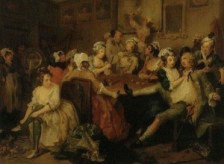Imagine that the ideals and assumptions of the Founding Fathers could somehow take bodily form and visit America. How might this entity feel seeing the Republic collapsing from greed-driven special interest politics?
I doubt the entity would be shocked. After all, the Founding Fathers had anticipated (and tried to prevent) just such a thing. However, what would be shocking is that those responsible for the collapse are leading members of the upper class. And as the shock subsides, the entity would feel betrayed. The Founding Fathers had assumed a privileged and powerful upper class would be a bulwark against the corruption of the state, not the agents and emissaries of it.
The influence on the Founding Fathers of the 17th century British philosopher, John Locke, is well known. Less known is the influence of the 18th century French philosopher, Baron Montesquieu. In the Spirit of the Laws Montesquieu had written that each type of government—Tyranny, Aristocracy, or Republic—had a corresponding “spirit” that goes along with it—fear, honor, or virtue. In order for a government to be successful, therefore, there had to be a match between the “spirit” of the laws and the “spirit” of the people. Thus, in order for Tyranny to work, the people would have to live in “fear.” In order for Aristocracy to work, the people would have to live in “honor.” And in order for a Republic to work, the people would have to live in—“virtue.”
Today we think of “virtue” as a rare and especially praiseworthy personal accomplishment. To the Founding Fathers, however, “virtue” was not rare but necessary, the lifeblood and essential ingredient of a nation of laws. In this they were influenced by Montesquieu, who defined “virtue” as the ability to put aside private interests and act selflessly on behalf of the common good. The Founding Fathers knew every Republic in history had fallen from a lack of “virtue.” Specifically, those lacking “virtue” would gain access to the machinery of government, diverting it from its proper use as an instrument of the common good to use it instead as a tool of special interests.
Of course, the ideal situation would be to have only people with “virtue” to be in control of the levers of government. But where are these people found? Are they distributed randomly through the population, as Plato thought…or are they clustered in one social class, as was assumed in the Aristocratic social systems of the old world? It was precisely on this point that the Founding Fathers stumbled, failing to rise above the class-based prejudices of their day. As property-owning gentlemen of the upper class, they took it for granted that the only class of people that could be trusted to be consistently “virtuous” in high office would be property-owning gentlemen such as themselves. And they took the obverse for granted as well—that those historically lacking property and great wealth could NOT be trusted to be consistently “virtuous” in high office. In the political lexicon of their day, allowing people without wealth to exercise power directly was sneeringly referred to as “mob rule.”
As they crafted the Constitution, therefore, it seemed prudent to the Founding Fathers to entrust the actual power of governing to property-owning gentlemen while excluding the mass of ordinary citizens from the direct exercise of power. Accordingly, they created the new American nation as a Constitutional Republic and not as a Democracy. The difference is that where citizens in a Democracy set policy and make laws by means of direct voting, citizens in a Constitutional Republic lack direct power and vote only to select representatives to set policy and make laws. And as a last-gap protection from “mob-rule,” they created the Electoral College, establishing that citizens would not vote for the President directly but only for suitable “electors” who, later and behind closed doors, would actually select the next President.
Be that as it may, the worse has happened: people without “virtue”—albeit our upper class—now control the levers of power. Our situation is dire, and each day brings more bad news and less reason to hope. Given this, what can ordinary Americans now do to protect ourselves and our nation from the continuing predations of our upper class?
Interestingly, contemporary moral development theory brings some needed illumination to this problem. According to moral development theory, morality is not an either/or thing, something one has or has not. Rather, moral awareness is complex and evolving, developing along a specific sequence of stages. Although different theorists number the stages differently, there is consensus there are three fundamental levels—the egocentric (only I count in my moral universe), the ethnocentric (only my group counts), and the worldcentric (everyone counts).
(Note: You can view every article as one long page if you sign up as an Advocate Member, or higher).





